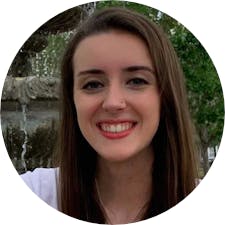Amid the dense foliage, ancient trees and rich soil that houses thousands of microbes in the McCarty Woods conservation area, Akito Kawahara sees it: a Great Purple Hairstreak butterfly.
The Florida Museum of Natural History Associate Curator who studies butterflies said he had never seen the delicate creature – defined by a striking blue line on its wing – until the encounter on one of UF campus’ most centrally located conservation areas. Though the moment was touching, he worries experiences like it will soon come to an end.
In December, UF Board of Trustees approved a 2020-30 Campus Master Plan that marked 2 of the 2.9 acres of the McCarty Woods as a future construction site for research buildings, UF’s Director of Planning Linda Dixon wrote in an email. The decision has been met with opposition from UF students, faculty and staff who have banded together to prevent the implementation of the proposal.
Future development sites are needed for various academic and research buildings, Dixon wrote. Development in the eastern third part of campus is required to foster a centralized, flexible learning environment.
“We need more buildings, and campus needs to grow,” Kawahara said. “But campus can grow in a different way, and it doesn't have to encroach on existing spaces. Natural areas like that should be perceived as a building in itself.”
The conservation area is a crucial resource for immersive hands-on learning and an experience that’s impossible to replicate in the classroom, Kawahara said. He said students have approached him after a lab in the woods for an Invertebrate Field Biology course with plans to switch their majors to biology.
“Those are the kinds of things that are, especially for the education component, essential,” he said. “And we're going to lose that.”
Though thousands of students have benefitted from the space, Kawahara said UF does not understand the area’s significance. Developers perceive it as an unused plot of land waiting to be built on, he said.
“That 30 minutes of time that we spent in McCarty could potentially have that impact about their careers in the future,” he said.
The current proposal would leave behindo about 1 acre of the woods, but students in The Wildlife Society at UF do not believe this is a sufficient solution. Savannah Cantrell, 21-year-old UF wildlife ecology and conservation junior, said the remaining land would not be useful to the wildlife.
“That acre that is going to be leftover is going to be severely disturbed, and the animals that are left aren’t going to be as successful as they are now with the almost 3 acres that they have,” she said.
Cantrell said she is insulted by UF’s refusal to acknowledge the pleas of students and faculty.
“We are the future of science,” she said. “If they don’t listen to their own scientists, then who are they really listening to?”
UF Wildlife Society President Sierra Scauzillo hosted two information sessions over Zoom Monday to explain the campaign to prevent construction in further detail. She said accurate evidence and facts will be instrumental in raising awareness about the issue.
“I don’t want people using this platform to insult UF officials, to create a negative environment or say things that sound factual but just aren’t true,” the 22-year-old UF wildlife ecology and conservation senior said.
The UF Board of Trustees is expected to make its final decision about the future of McCarty Woods mid-March, and a project report is expected to be completed and presented before then, Scauzillo said.
“By the end of February, we should all start sweating,” she said.
The group created an interest form, an Instagram and a Facebook for students looking to get involved in the movement. Their petition reached more than 10,600 signatures as of Thursday.
“Maybe if we win this, we’ll have a party, a socially distanced party,” she said. “A party in McCarty.”
Contact Abigail Hasebroock at ahasebroock@alligator.org. Follow her on Twitter @abbeyhasebroock.

Abigail is a second-year journalism major covering university general assignment news for The Alligator. When she’s not catching up on school or reporting, she’s spending time outside, reading or reorganizing her Spotify playlists - usually all at the same time.






